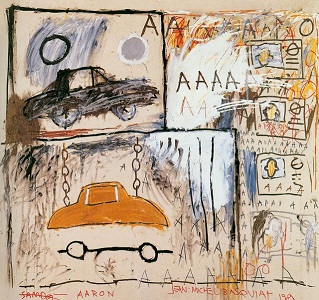1/ Privacy is essential to human creativity. A thread...
The first Jean-Michel Basquiat painting ever sold was bought for $200 and signed with the alias SAMO.
Who was SAMO? And how did their work impact a young Basquiat?
The first Jean-Michel Basquiat painting ever sold was bought for $200 and signed with the alias SAMO.
Who was SAMO? And how did their work impact a young Basquiat?

2/ In 1978, not far from where I grew up, provocative graffiti from the pseudonymous SAMO began appearing around the Lower East Side.
The street art employed subversive tones, targeting established art institutions with messages like “SAMO FOR THE SO-CALLED AVANT-GARDE.”
The street art employed subversive tones, targeting established art institutions with messages like “SAMO FOR THE SO-CALLED AVANT-GARDE.”

3/ As a budding artist and school dropout, Basquiat relied on the pseudonym SAMO to develop his voice + explore sensitive topics like class struggle and traditional power structures.
Without the freedom provided by privacy, Basquiat may never have fully formed as an artist.
Without the freedom provided by privacy, Basquiat may never have fully formed as an artist.

4/ History is filled with important lessons, if we would only listen.
Basquiat is one example of the critical link between privacy<>creative expression. Others include the Brontë sisters (Jane Eyre, Wuthering Heights) and Benjamin Franklin.
Basquiat is one example of the critical link between privacy<>creative expression. Others include the Brontë sisters (Jane Eyre, Wuthering Heights) and Benjamin Franklin.
5/ Why is Basquiat’s story relevant to Web3?
Our online lives are controlled by centralized entities who, despite our wishes, have actively de-anonymized our browsing habits to exploit us for financial and political gain.
Web3 is our Thermopylae. It’s time to make a stand.
Our online lives are controlled by centralized entities who, despite our wishes, have actively de-anonymized our browsing habits to exploit us for financial and political gain.
Web3 is our Thermopylae. It’s time to make a stand.
6/ Thankfully, there are Web3 projects doing great work for privacy, of which Zcash is notable.
Shielded by default txs, trustless setup, the Halo Proving System. There are so many great things on the horizon for $ZEC and #Zcash with the forthcoming NU5 protocol upgrade.
Shielded by default txs, trustless setup, the Halo Proving System. There are so many great things on the horizon for $ZEC and #Zcash with the forthcoming NU5 protocol upgrade.
7/ Web3 can help us take ownership over our digital lives. But without strong privacy at the protocol level, we’re destined for an Orwellian dystopia.
How many of humanity’s great treasures would have been relegated to the dustbin of history without privacy?
Think about it.
How many of humanity’s great treasures would have been relegated to the dustbin of history without privacy?
Think about it.
• • •
Missing some Tweet in this thread? You can try to
force a refresh




